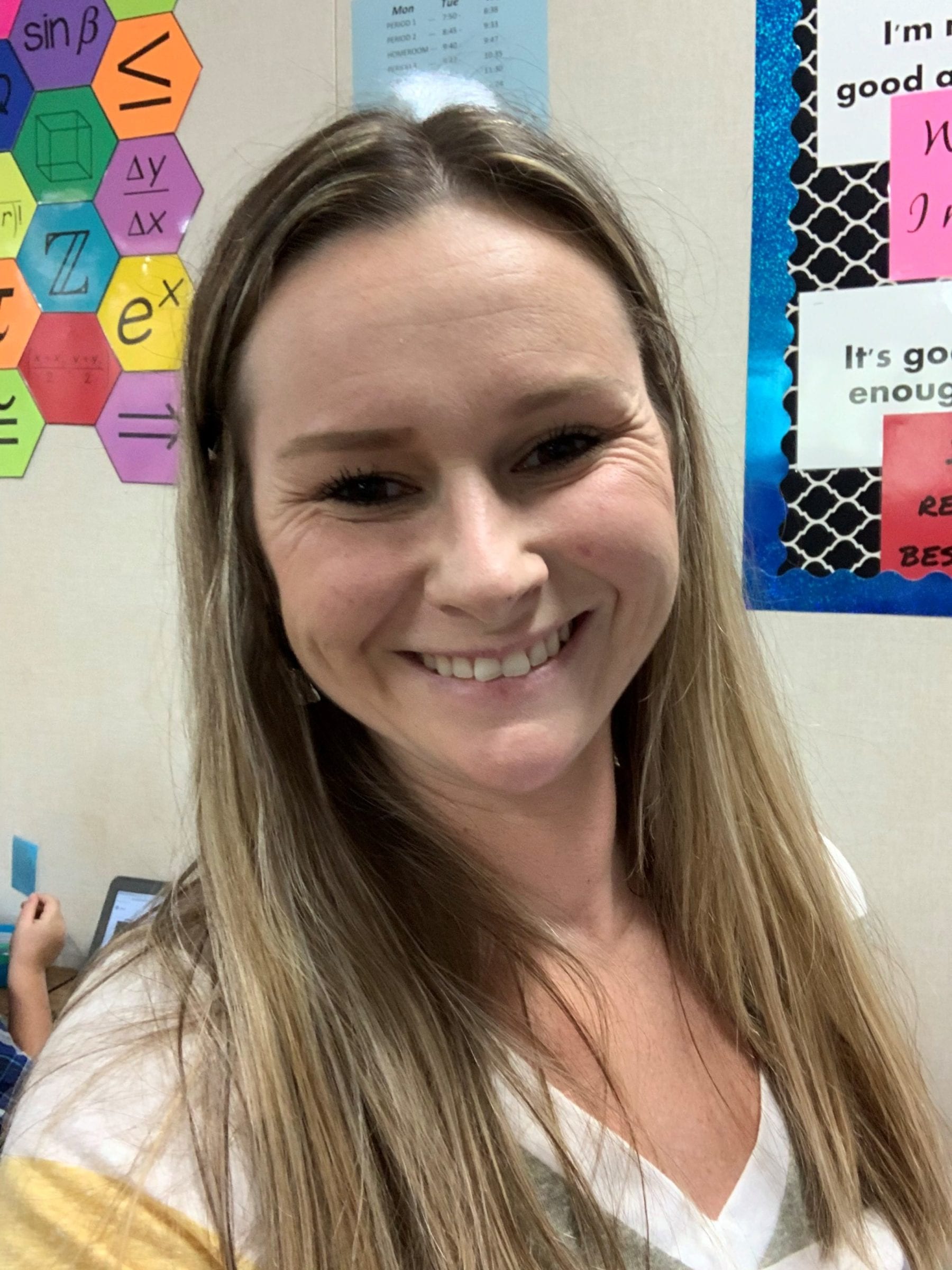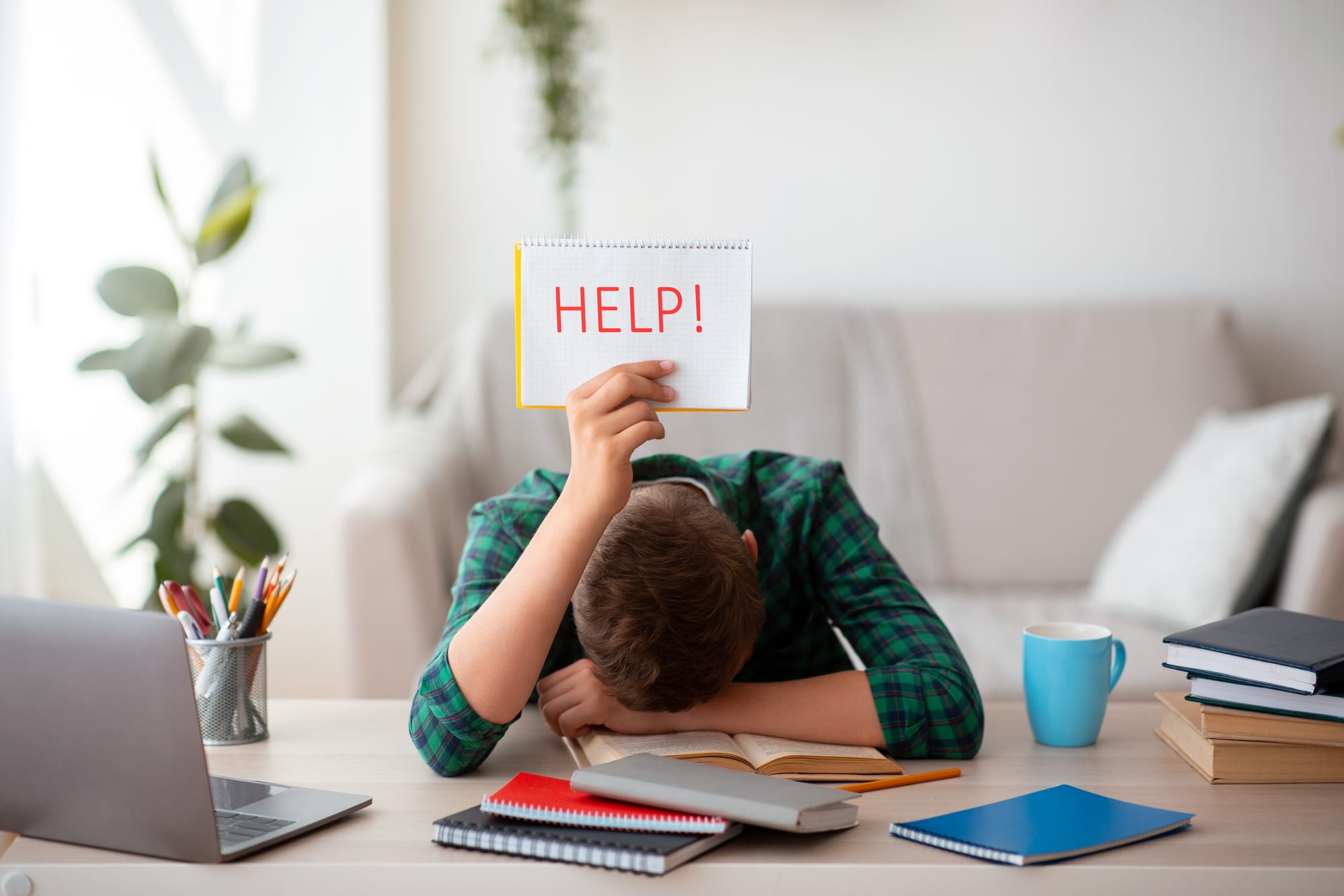Joline Martinez suspected many of her students were cheating after her school closed last spring and she transitioned to distance learning. They showed their work on equations and came up with the correct answers, but something was definitely off, says the Yosemite High School math teacher.

Joline Martinez
“My students were solving problems with ridiculous fractions,” says Martinez, a member of Yosemite Unified Teachers Association. “They were using steps they had never been taught. It was a huge issue. I suspected they were cheating. I was losing sleep over this.”
Martinez was so frustrated, she posted about it on CTA’s “Teaching, Learning and Life During COVID-19” Facebook page, and found she was not alone. Numerous CTA members responded to her post, saying they also suspected students were cheating while working from home.
One of them, Maggie Strode, was troubled that students who were struggling when attending school on campus were suddenly turning in perfect papers during distance learning.
“Students were combining several steps into one while solving equations, and always moved the variable to the left side of the equation,” says Strode, a math teacher at South Hills High School and member of the Covina Unified Education Association. “It’s something I do not have my students do, because when they are doing the equations on their own, it leads to errors.” During online office hours she asked them to solve similar problems, and they didn’t have a clue.
Both teachers figured out their students were using Photomath, an app that utilizes a cellphone’s camera to recognize mathematical equations and display a step-by-step solution onscreen — which may differ from how students were taught.
“It’s frustrating,” says Strode. “I was creating videos showing students how to do the work, but they weren’t watching them. Instead, they used this app. It’s much easier to keep an eye on students when you have them in your classroom. When they work from home, it is much more challenging.”
“I gave them the opportunity to resubmit. Students were going through a lot, and I wanted to demonstrate compassion.” —Karin Prasad, Liberty Education Association
Students are more tempted with distance learning
When schools closed abruptly last March due to COVID-19, older students knew that their grades couldn’t be lowered, only raised. Nonetheless, many cheated while working from home, even those with passing grades, say teachers.
Educators admit they were so overwhelmed with transitioning to distance learning that it was difficult to police students who were intent on beating the system. Students can Google answers instantly on their phones during exams and watch videos about how to cheat on YouTube. (Some colleges are having students install a second camera on their devices and clearing their workspace, so that instructors can see students’ hands during exam time.)

Karin Prasad
Distance learning has created more temptations for students, observes Karin Prasad, an English teacher at Heritage High School in Brentwood. She uses turnitin.com, an online program that compares her students’ work with other student essays in the system and also published work. After schools closed due to the pandemic, two essays were red-flagged in what’s called a “similarity report.”
Normally she would have given both students a zero on the assignment. But Prasad gave them some leeway because of the state of the world.
“Being in a pandemic is weird and scary,” says the Liberty Education Association member. “So instead of giving them a zero, which I would have done in a normal school year, I gave them the opportunity to resubmit. Students were going through a lot, and I wanted to demonstrate compassion.”
Martinez also didn’t make a big fuss the way she would have under normal circumstances. “I didn’t really push the issue. I didn’t want to have to contact all of the parents; I have 200 students in my classes. It was definitely an uphill battle.”
This year will be different, vows Martinez, whose district will begin the year online. Students will be held accountable for work done from home, and the no-cheating rule will be strictly enforced.
“I give timed quizzes, where they only have a short time for each question — and no time to look it up.” —Pedro Quintanilla, Imperial Valley Teachers Association
How teachers can put the kibosh on cheating
“If you can Google the answer to a question, it’s not worth asking,” says Katie Hollman, a seventh grade math teacher at Walter Stiern Middle School in Bakersfield. “Students immediately jump on Google to hunt for answers in class by opening a second tab on their computer, so you can just imagine what happens at home on cellphones.”
Hollman, a member of the Bakersfield Elementary Teachers Association, asks students to explain their work on Flipgrid videos they create. She also has students create their own real-world math word problems, and then solve them. It might involve visiting a restaurant and explaining the bill, deciding how much they want to tip, adding the tax, and figuring out percentages, for example. Or going to various grocery stores and comparing the unit rates of various items for sale to discern which is a better bargain. Because students are mostly at home, the research for menu and grocery store items happens online, of course.

Pedro Quintanilla
Imperial High School teacher Pedro Quintanilla can tell if students are cheating on exams while solving math problems with paper and pencil, by looking at handwriting when assignments are submitted online. If the work seems too perfect, without pressure points in some spots and nothing crossed out or erased, he becomes suspicious.
“If you don’t see any struggle, that is a big sign,” says Quintanilla, an Imperial Valley Teachers Association member.
“One of the ways I assess knowledge of major concepts is by giving a timed quiz, and have them submit their answers to each question, one at a time, almost immediately. Also, I include a Quizzizz activity [a fast-paced, interactive game] where they need to perform the skills learned in a lesson. In addition, no pun intended, I have them submit their notes for a lesson. And I give timed quizzes, where they only have a short time for each question — and no time to look it up.”

Suzie Priebe
Suzie Priebe, a history teacher at Amelia Earhart Middle School, asks students to write about things they are knowledgeable about on the first day of class so she can hear their “voice” and get a “flavor” of how they write. She compares their tone to essay questions later, to determine authenticity.
She also asks them interpretive questions on history, such as “What do you think is the most important thing about the Bill of Rights and why?”
“In history, it’s not as important to memorize, because you look up things on Google, such as when the Declaration of Independence was signed. But knowing why it was signed and being able to explain that is just better.”
Other ideas to prevent cheating online:
- Mix it up, with tests having a variety of multiple-choice, true/false and open-ended questions. It’s more difficult for students to share answers when they must explain concepts.
- Have every student start the exam at the same time and set a time limit. The key is having enough time for students who know the information to respond, but not enough time for students who don’t know the material to search online for answers.
- Only show one question at a time, so students can’t be searching ahead on Google.
- Change test question sequence, so that all students do not have the same question at one time, to avoid screen sharing.
- Give students different versions of the same test to thwart screen sharing.
- Give students their scores all at the same time, so that students who finish early don’t confirm answers for those still working.
- Increase points for class participation.
- Talk about integrity, and have students sign an “academic integrity” agreement.
“I want my students to be successful. If they rely on shortcuts and cheat, they won’t survive in the real world.” —Maggie Strode, Covina Unified Education Association
Encourage students to be honest
Talking to students about integrity, trust and doing the right thing also prevents cheating.

Maggie Strode
“I let my students know that once you are labeled a cheat, it’s very hard to regain trust,” says Strode. “I tell students I’d rather they not turn in an assignment than turn in work they didn’t do. They don’t realize that they sometimes put more time and effort into cheating than it would take to just do the assignment. I love my students. I want them to be successful — not only in my classroom, but in life. If they rely on shortcuts and cheat, they won’t survive in the real world. No one will make allowances for them there.”
Hollman discusses cheating in her weekly “Life Lessons with Hollman” sessions, urging students to resist the temptation and instead ask for help.

Katie Hollman
“I want to help them understand the material so we can fix the problem. I make time for tutoring during online office hours. And I explain that if they cheat in college, they won’t just get a zero on an assignment — they will get kicked out of school.”
She also explains that it’s in their own best interest: If enough students cheat, the teacher assumes the class has mastered the material, and makes the curriculum even more challenging.
Quintanilla talks to his students about the importance of digital citizenship and the value of the honor system in his classes.
“With distance learning, you have to establish a good relationship with students, and then, when you emphasize honesty, you have more buy-in from them.”
“I would rather see the child attempt something, fail, and ask for help, rather than not try.”
Distance Learning: Parents Doing Children’s Work?
Even in normal times, second grade teacher Nailah Legohn has seen the lines blur between parental support and parents doing the homework, so their children don’t fall behind. But with distance learning, parents and sometimes older siblings are doing schoolwork of children more frequently.

Nailah Legohn
“Sometimes it’s hard to know who is really doing the work,” says Legohn, a teacher at Ridgemoor Elementary School in Sun City. “The little ones need a lot of parent support. And they may be saying, ‘I don’t get it.’ If they whine and cry enough, the parent may give in and provide the answer because they want the child to get credit — or they want their child to go outside and play. Parents are under so much pressure. Many of them are also working at home while trying to help their children.”
Parents think they are helping, but they are not, says Legohn, a member of the Menifee Teachers Association. “I tell them, ‘Please don’t do the work for them.’ I explain that they are not setting up their child for success. If kids know that someone else is going to provide the answer, they will expect that to happen when they go back into the regular classroom. And that’s not how it’s going to be. When schools reopen, students are going to have to do the work themselves. If they aren’t used to it, it will be much more of a struggle.”
Legohn asks her students to circle problems that are difficult for them, and then she helps students understand the material by offering extra help during virtual office hours. They can also message her on Google Classroom to ask questions.
“I want my students to love learning and understand how to learn,” says Legohn. “I am pushing for them to have a growth mindset and the ability to ask questions. I would rather see the child attempt something, fail, and ask for help, rather than not try. Parents are role models, and the best way they can help is teaching their children to take responsibility for their own learning.”
